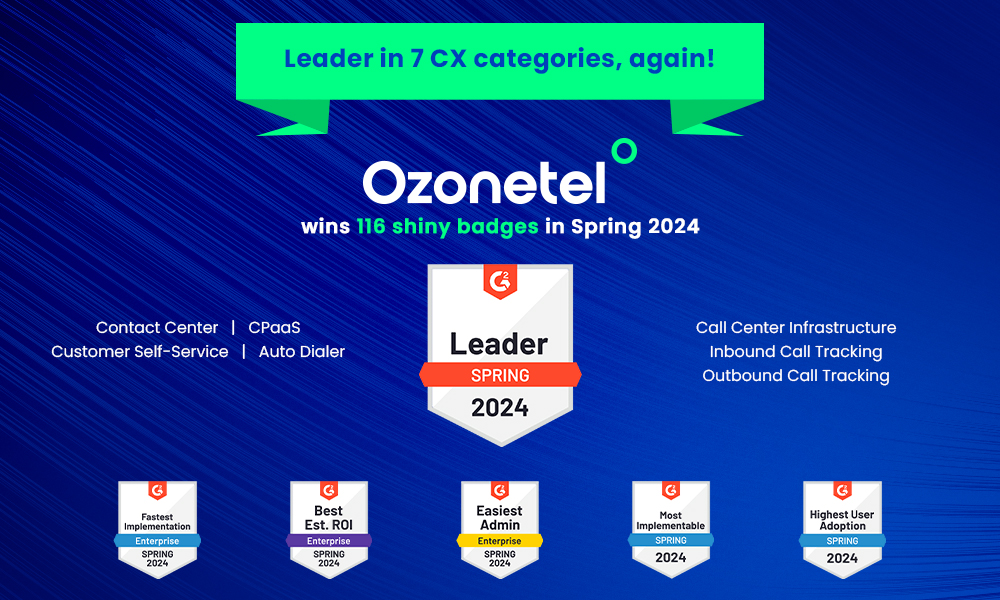- Resources
- What is Moment of Truth? How Businesses Can Identify & Leverage Them Across the Consumer Journey
What is Moment of Truth? How Businesses Can Identify & Leverage Them Across the Consumer Journey

A moment of truth (MOT) is a critical juncture in the customer journey where a consumer’s perception of a brand or product is significantly influenced. It’s an opportunity for businesses to create a positive impression, enhance customer satisfaction, and drive loyalty. In essence, MOTs are those pivotal instances that determine whether a customer will continue to engage with a brand or switch to a competitor. Moment of truth doesn’t necessarily happen when a customer interacts with your agent. It could happen at any point during the customer’s journey with the brand.
Importance of MOT in the Consumer Journey

A survey conducted by a North American bank across its branches found that the ability to turn moments of truth to their advantage by solving problems effectively was a distinguishing feature of its better-performing branches. Identifying and leveraging moments of truth is crucial for businesses, as they directly impact customer satisfaction, retention, and ultimately, revenue.
By understanding and effectively managing these moments, companies can foster long-lasting relationships with their customers, increase brand loyalty, and gain a competitive edge in the marketplace. Furthermore, MOTs can provide valuable insights into areas where improvement is needed, allowing businesses to refine their strategies and processes for an enhanced customer experience.
Moment of Truth in Marketing
In marketing, the Moment of Truth represents a critical point where the customer’s perception of a brand, product, or service is significantly influenced. It is an opportunity for marketers to create a positive impression, increase customer satisfaction, and foster loyalty. Leveraging MOTs in marketing can help businesses gain a competitive edge and drive long-term growth.
Moment of Truth in Service Marketing
In service marketing, a Moment of Truth occurs when a customer interacts with a service provider and forms an impression about the quality of service. These moments are crucial, as they directly impact a customer’s perception of the brand and their likelihood of becoming a loyal patron. Examples of service marketing MOTs include a customer’s experience while making a reservation, interacting with a service representative, or receiving after-sales support.
How to Identify Moment of Truth in Service Marketing
Identifying the moments of truth (MOT) in service marketing is crucial for understanding the critical touchpoints where customer perceptions are formed, and loyalty is influenced. Here is how you can identify MOT in service marketing.
Identifying MOT in Service Marketing
- Customer Touchpoints
- Customer feedback
- Mapping the Customer Journey
- Monitoring Social Media & Online Reviews
Customer Touchpoints
One way to identify moments of truth in service marketing is by examining customer touchpoints. Touchpoints are points of interaction between a customer and a service provider, such as websites, social media, call centers, or physical locations. Analyzing these touchpoints can provide valuable insights into when and where customers form their opinions about a service, allowing businesses to optimize these moments for a positive impact.
Customer Feedback
Another method to identify MOTs in service marketing is through customer feedback. By gathering and analyzing feedback from customers, businesses can pinpoint areas of their service that are meeting or falling short of expectations. This information is invaluable for identifying critical moments in the customer journey where improvements can be made to enhance the overall customer experience.
Mapping the Customer Journey
Mapping the customer journey is an effective approach to identifying MOTs in service marketing. By visualizing the path customers take when interacting with a service provider, businesses can gain insights into the key moments that shape customer perceptions and experiences, allowing them to focus on improving these critical instances.
Monitoring Social Media and Online Reviews
Monitoring social media platforms and online reviews can also help businesses identify MOTs in service marketing. By paying attention to customer comments, complaints, and praises on these platforms, companies can gather insights into the moments that matter most to their customers, and tailor their strategies accordingly.
Leveraging MOT in Service Marketing
Leveraging moments of truth (MOT) in service marketing can help businesses create memorable experiences that lead to higher customer satisfaction and loyalty. Here’s how businesses can leverage moments of truth in service marketing.
Personalization
Personalizing the customer experience is an effective way to leverage MOTs in service marketing. By using customer data to tailor interactions and communications, businesses can create a more meaningful connection with their customers, which can lead to increased satisfaction and loyalty.
Timely Communication
Delivering timely and relevant communications at various touchpoints of the customer journey creates positive moments of truth (MOTs), fostering a strong emotional connection with customers. This approach ensures that customers feel valued and supported throughout their experience, ultimately leading to enhanced customer satisfaction and loyalty.
Consistent Branding
By presenting a unified image and message across all customer touchpoints, businesses create a cohesive and memorable experience. This consistency builds trust and familiarity, making customers more likely to return and recommend the brand to others.
Omnichannel Approach
Offer a seamless experience across multiple channels to ensure consistency in MOTs and prevent disjointed customer interaction. By integrating various touchpoints and maintaining a unified brand experience, customers can effortlessly transition between channels, resulting in enhanced satisfaction and a deeper sense of connection with your brand.
Moment of Truth in Customer Service
Moments of truth in customer service are pivotal instances during a customer’s interaction with a support representative that shape their perception of the brand. These moments have a significant impact on customer satisfaction and loyalty. Examples of customer service MOTs include a customer’s experience while waiting on hold, the quality of assistance received, and the resolution of their issue or concern.
How to Identify MOT in Customer Service
By identifying moments of truth (MOT) in customer service, businesses can tailor their strategies to deliver exceptional service and build lasting customer relationships. Here is how you can identify MOT in customer service.
Identifying MOT in customer service
- Customer Complaints
- Service Performance Metrics
- Direct Customer feedback
- Monitoring Support Interactions
Customer Complaints
Customer complaints can be a valuable source of information for identifying moments of truth in customer service. By analyzing the nature and frequency of complaints, businesses can gain insights into the aspects of their customer service that require improvement, allowing them to address and optimize these critical moments.
Service Performance Metrics
Monitoring service performance metrics is another effective way to identify MOTs in customer service. Key performance indicators (KPIs) such as average handle time, first call resolution, and customer satisfaction scores can provide a comprehensive understanding of customer service performance, highlighting areas where improvements can be made to enhance the moments of truth.
Direct Customer Feedback
Gathering direct customer feedback through CSAT surveys, interviews, and focus groups can help businesses identify MOTs in customer service. By actively engaging customers and listening to their experiences, companies can gain valuable insights into the moments that matter most and make improvements accordingly.
Monitoring Support Interactions
Observing customer support interactions, either in-person or through recorded calls, can also help businesses identify MOTs in customer service. By analyzing these interactions, companies can pinpoint moments where support representatives excel or struggle, allowing them to address and improve these critical instances in the customer journey.
Leveraging MOT in Customer Service
Leveraging moments of truth (MOT) in customer service empowers businesses to create meaningful interactions that leave a lasting impact on their customers. Here’s how businesses can leverage moments of truth in customer service.
Proactive Customer Service
Proactively addressing customer concerns and needs is another way to leverage MOTs in customer support. By anticipating potential issues and addressing them before they escalate, businesses can create a more seamless and positive customer experience, leading to increased satisfaction and loyalty.
Employee Training and Empowerment
Investing in employee training and empowerment is crucial for leveraging MOTs in customer service. By providing support representatives with the knowledge, skills, and authority to address customer concerns, businesses can create positive experiences during moments of truth, leading to increased satisfaction and loyalty.
Efficient Call Center Software
Implementing efficient call center software is another way to leverage MOTs in customer service. Advanced features such as intelligent call routing, real-time analytics, and CRM integration allow businesses to streamline their customer support processes, improving the quality of service and enhancing the moments of truth for their customers.
Continuous Improvement
Embracing a culture of continuous improvement is essential for leveraging MOTs in customer service. By regularly reviewing and refining customer service processes, businesses can ensure that they consistently provide exceptional support, maximizing the positive impact of moments of truth on customer satisfaction and loyalty.
Moment of Truth in Sales
A moment of truth in sales occurs during the buying process when a customer decides whether to purchase a product or service. These moments are critical, as they directly influence a customer’s likelihood of becoming a loyal patron and generating revenue for the business. Examples of sales MOTs include a customer’s experience while browsing a website, engaging with a sales representative, or evaluating a product’s features and benefits.
How to Identify MOT in Sales
To identify moments of truth (MOT) in sales, businesses should analyze interactions, responses, and customer behaviors throughout the sales journey and accordingly optimize their sales strategies to drive conversions and build lasting customer relationships. Here’s how businesses can identify moments of truth in sales.
Identifying Moments of Truth in Sales
- Sales Conversion Rates
- Buyer Behavior Analysis
- Mapping the Sales Process
- Observe Sales Interactions
Sales Conversion Rates
Tracking sales conversion rates can help businesses identify moments of truth in sales. By analyzing the proportion of leads that convert into customers, businesses can gain insights into the effectiveness of their sales processes and identify critical moments where improvements can be made to increase conversions.
Buyer Behavior Analysis
Buyer behavior analysis is another way to identify MOTs in sales. By examining factors such as customer demographics, purchase patterns, and decision-making processes, businesses can better understand the key moments that drive customer decisions and leverage these insights to improve their sales strategies.
Mapping the Sales Process
Mapping the sales process can help businesses identify MOTs in sales. By visualizing the steps customers take during the buying journey, companies can gain insights into the critical moments that influence purchase decisions and tailor their sales strategies to optimize these instances.
Observe Sales Interactions
Monitoring sales interactions, either through in-person observations or recorded calls, can help businesses identify MOTs in sales. By analyzing these interactions, companies can pinpoint moments where sales representatives excel or struggle, allowing them to address and improve these critical instances in the sales process.
Leveraging MOT in Sales
Leveraging moments of truth (MOT) in sales can revolutionize customer interactions, boost conversion rates, and enhance overall sales performance. Here’s how businesses can capitalize on moments of truth in sales. Here’s how to leverage MOT in sales.
Effective Communication and Negotiation
Utilizing effective communication and negotiation skills is crucial for leveraging MOTs in sales. By engaging with customers in a professional and persuasive manner, sales representatives can build trust and credibility, ultimately increasing the likelihood of successful conversions during moments of truth.
Utilizing Call Center Software for Lead Management
Integrating call center software into sales processes can help businesses further leverage MOTs. Features such as lead management, real-time analytics, and CRM integration enable sales teams to efficiently manage leads, track performance, and deliver personalized customer interactions, ultimately enhancing sales and driving revenue growth.
Data-Driven Sales Strategies
Adopting data-driven sales strategies is essential for leveraging MOTs in sales. By utilizing data and analytics to inform sales tactics, businesses can optimize their efforts, ensuring that they effectively address customer needs and preferences during critical moments in the buying process, ultimately increasing conversion rates and driving growth.
Excel in Moments of Truth with Ozonetel’s CX Platform
Ozonetel’s single, unified CX platform offers a comprehensive suite of features designed to enhance moments of truth across various customer interactions. With capabilities such as intelligent call routing, real-time analytics, and seamless CRM integration, Ozonetel empowers businesses to deliver personalized and efficient customer service.
Robust Omnichannel CCaaS:
One of India’s leading stockbroking firms recognized the importance of achieving customer service excellence at critical moments of truth (MOTs). They leveraged Ozonetel’s robust CCaaS (Contact Center as a Service) platform to successfully handle high and fluctuating call volumes. With Ozonetel they could handle 40,000+ calls daily and up to 1340 calls concurrently. This ensured high uptimes, uninterrupted service continuity, and higher CSAT for the stockbroking firm.
Self-service IVR:
A leading insurtech firm leveraged the self-service IVR to help customers at critical junctures, solving a wide range of requests — policy endorsements, changes, renewals, and more — quickly and without any agent intervention. Callers could also easily update their policies directly on the IVR. As a result, the number of queries handled entirely via self-service IVR and without agent intervention went up from 0 to 3000 calls per month. The solution led to 20% less time spent in IVR, 20% higher routing accuracy, and 50% faster resolutions.
Advanced Routing:
An emerging health-tech brand leveraged Ozonetel’s advanced routing and ‘sticky agent’ features to connect every patient with this familiar and consistent point of contact, regardless of their channel choice. Patients found it easier to clarify doubts with these advisors rather than a stranger, leading to deeper relationships, higher trust, and a remarkable 54% increase in conversions at critical moments of truth during their healthcare journey.
Deep CRM Integration:
Ozonetel’s CRM integration capabilities played a pivotal role in crafting meaningful moments of truth for one of India’s leading e-commerce firms. Whenever a customer called, agents had instant access to all relevant information, fostering personalized interactions that left customers feeling valued. This seamless access to data not only boosted productivity but also led to faster call resolutions, reducing Average Handle Time from 5 to 3.5 minutes per call while delivering a better CSAT.
In Conclusion
As demonstrated throughout this article, identifying and leveraging moments of truth is essential for businesses to succeed in today’s competitive landscape. By understanding and optimizing these critical moments, companies can create positive customer experiences, increase satisfaction and loyalty, and ultimately drive revenue growth.
Ready to take control of your call transfer
experience for better CX outcomes?
Prashanth Kancherla
Chief Operating Officer, Ozonetel Communications
Over the past decade, Prashanth has worked with 3000+ customer experience and contact center leaders...
Chief Operating Officer, Ozonetel Communications
Over the past decade, Prashanth has worked with 3000+ customer experience and contact center leaders to comprehensively understand the need for effective and efficient customer communications at every step of their journey with a brand. Deeply embedded in today’s CCaaS ecosystem, he has been instrumental in Ozonetel's growth and contributed in various roles including product management, sales, and solution architecture.







